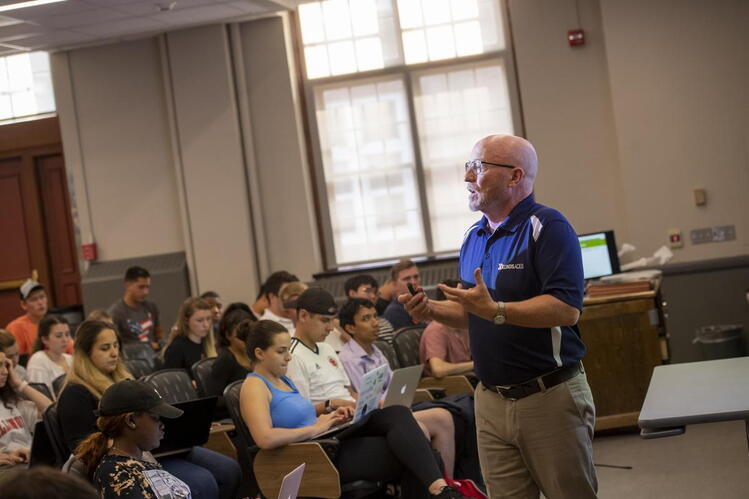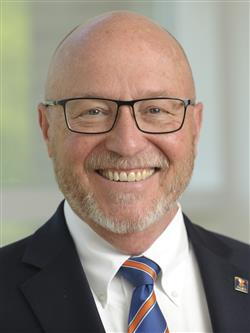From farm fields to lecture halls: A career shaped by agriculture and academia

If you look closely at the marble staircases in Mumford Hall, you’ll see imprints worn into the stone—evidence of generations of students passing through, their footsteps leaving a mark. Among these students was Paul Stoddard, now a senior lecturer at the University of Illinois Urbana-Champaign College of Agricultural Consumer and Environmental Sciences. Stoddard’s journey took him from the farm fields of Illinois to the front of a lecture hall, where he has shaped the minds of thousands of students.
Rooted in agriculture
Growing up on a farm in Piatt County, about 25 miles west of Champaign-Urbana near Allerton Park, Stoddard always thought his future was set — he would farm. It was the natural path, the one his family had taken for generations. To prepare, he attended Purdue’s Agricultural Winter Short Course, which was a nine-week course focused on the production side of agriculture.
A detour into academia
But even as Stoddard prepared for a life on the farm, a part of him was curious about what else was out there. While many of his peers stayed close to home, Stoddard explored something different — a pursuit that didn’t involve tractors or corn fields. That curiosity led him to Santa Fe, New Mexico, and St. John’s College, where the Great Books program traded traditional lectures for thought-provoking dialogue.
“I’m a big believer that to really grow, you need a well-rounded education,” he said. “You need to explore things outside of your main interests.”
St. John’s College didn’t just expand his thinking, it sparked a passion for academia that would later inspire a career change.
Still, the pull of home never went away. After a year, Stoddard returned to Illinois, not because he had abandoned the desire to explore, but because he wanted to connect his growing academic interests with something that he was passionate about: agriculture. He transferred to the University of Illinois and studied economics in the College of Liberal Arts & Sciences, while continuing to take electives in the College of ACES to stay grounded in his roots.
A career in agriculture and finance
After graduating in 1980, Stoddard entered the workforce, combining his love for agriculture with his growing expertise in business and finance.
He spent five years working for Stoddard Farm Management alongside his father and sister before transitioning to commodities trading. After another five years, he joined Hertz Farm Management, where he specialized in appraisals.
Stoddard’s career continued to evolve, leading him to Farm Credit, where he worked for 14 years and eventually served as chief appraiser.
While still at Farm Credit, he found his way back to a long-standing interest sparked decades earlier in Santa Fe. He began teaching an appraisal course at the University of Illinois — a chance to blend hands-on experience with academic exploration.
An unexpected calling: Teaching
Over time, teaching moved from a side pursuit to a clear calling. In 2012, he embraced it fully, stepping into a full-time role at the University of Illinois.
Early on, he taught courses in farm management, agricultural marketing, and appraisal, quickly discovering a passion for education. Now, he teaches agricultural marketing, commodity futures and options, food and agribusiness management, and negotiations.
“It is so rewarding to come back to the place that I was a student,” Stoddard said.

“I’ve learned so many things while teaching, including the powerful tool of online learning,” he added. During the COVID-19 pandemic, Stoddard transitioned many of his classes online, something he wouldn’t have ever thought possible.
“I found that many students, especially those who might feel anxious to participate in a lecture hall full of students, were often more engaged and willing to participate online than in person,” Stoddard said. Because of this, he now offers one of his classes in a hybrid format.
But for him, teaching was never just about the material — it is about the students. “It is all about the personal connection,” Stoddard said. Despite the size of his classes, he makes an effort to learn names, believing that a personal connection can make all the difference.
“The most meaningful part of teaching is the ability to make a little bit of difference in a whole lot of lives,” Stoddard said. Over the years, more than 11,500 students have passed through his classroom. Not only have students learned technical knowledge about agriculture, they have also learned life lessons and people skills, which Stoddard argues is even more important.
For Stoddard, teaching is where all his passions come together — a place where he can stay rooted in agriculture while inspiring students to think critically, ask bold questions, and look beyond the familiar.
A student’s perspective
As I write this, I can’t help but reflect on the impact Professor Stoddard and his class, ACE 231 food and agribusiness management, had on me. Sure, I learned a semester’s worth of technical knowledge about food and agribusiness, but what stuck with me most were the stories he shared and the advice that he gave.
One of our final class periods was dedicated to 27 pieces of advice — each one a lesson he had gathered over the years. Stoddard had the class write them down as part of an assignment, but for me, it was more than just another task. That list still sits in a binder in my bookbag, a reminder of the kind of professional and person I want to be. Here are five of the points that resonated with me the most:
- What’s the story you want to tell when you are 90 years old?
- If you are the smartest person in the room, you are in the wrong room.
- Live your life on purpose.
- Be grateful.
- Keep asking questions.
These pieces of advice from Professor Stoddard continue to influence me as a student, a professional, and a friend. One of my favorite parts of being an ACES student is the faculty and staff, like Professor Stoddard, that go above and beyond to teach me not only how to be a successful professional, but more importantly, how to be a good human being.